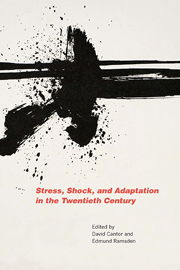Book contents
- Frontmatter
- Contents
- Acknowledgments
- Introduction
- Part One Packaging Stress
- 1 Evaluating the Role of Hans Selye in the Modern History of Stress
- 2 Stress and the American Vernacular: Popular Perceptions of Disease Causality
- Part Two Trauma and Acute Stress
- Part Three War
- Part Four Work
- Part Five Managing Stress
- Part Six Surveilling Stress
- List of Contributors
- Index
2 - Stress and the American Vernacular: Popular Perceptions of Disease Causality
from Part One - Packaging Stress
Published online by Cambridge University Press: 05 April 2014
- Frontmatter
- Contents
- Acknowledgments
- Introduction
- Part One Packaging Stress
- 1 Evaluating the Role of Hans Selye in the Modern History of Stress
- 2 Stress and the American Vernacular: Popular Perceptions of Disease Causality
- Part Two Trauma and Acute Stress
- Part Three War
- Part Four Work
- Part Five Managing Stress
- Part Six Surveilling Stress
- List of Contributors
- Index
Summary
FASEB Journal, the journal of the Federation of American Societies for Experimental Biology, is a well-known scholarly publication dedicated to the experimental biological and biomedical sciences. It publishes highly technical reports of the latest results of research on molecular and cellular physiology, immunology, and the like. It may thus have come as somewhat of a surprise to subscribers to find Paris Hilton as the subject of an editorial in the September 2007 issue. The journal's editor in chief used his monthly editorial space to trace the lineage of stress from Hans Selye to Paris Hilton. Hans Selye is, of course, the experimental scientist considered to be the father of the stress concept in physiology. Paris Hilton is, of course, the heiress-socialite whose dalliances and antics fill the pages of tabloid newspapers. She caught the attention of the editor in chief of FASEB Journal in May 2007 because a Boston Globe article reported her to be under such stress prior to her upcoming incarceration that she was unable to eat. As he quipped in the editorial, “Since her stress preceded the trauma, Paris Hilton may be the first well-documented case of ‘Pre-Traumatic Stress Disorder.’”
I begin with this story because it nicely encapsulates the interplay between professional and popular discourse in constructing the public understanding of the biomedical concept of stress. This chapter investigates when, how, and why stress entered the American vernacular.
- Type
- Chapter
- Information
- Stress, Shock, and Adaptation in the Twentieth Century , pp. 49 - 70Publisher: Boydell & BrewerPrint publication year: 2014

